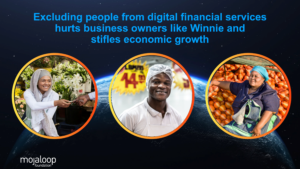Tackling Financial Inequality and Harnessing Digital Transformation
More than one hundred countries have established mobile money transaction systems, yet there are still more than 1.7 billion people worldwide who remain ‘unbanked’, and even those who are banked are often disconnected from financial services.
At the Mojaloop Foundation, we believe that inclusive real-time payments, led by the private sector, have a prominent role to play in closing this gap.
Meet Winnie
Let’s imagine what it’s like for a shopkeeper in Africa, named Winnie. She needs multiple digital financial services ranging from savings to credit, to receipt-based payments on a simple mobile phone. Without an inclusive real-time payment system (RTPS) model, banks and mobile money accounts are unlikely to be able to interoperate without high transaction fees.
So, Winnie will most likely have two wallets, two bank accounts, credit from her suppliers, and at least one loan from a microfinance institution. She ends up paying every time she moves money between these service providers. And she may have to wait for hours, or even days, to receive her payment after selling something at her shop – which she simply can’t afford.
Interoperability Drives Inclusion
To avoid these fees and delays, an in-country payment ecosystem must put interoperability right at the heart of its RTPS model. More and more central banks, digital financial service providers (DSFPs), and mobile money providers are beginning to understand that if they wish to see genuine, real growth, they need payment interoperability.
Mojaloop’s interoperable RTPS design is purpose-built for creating financial inclusion, especially in emerging markets where affordable, low-value transaction platforms are so desperately needed.
Mojaloop achieves this by implementing several of the key principles defined by the Level One Project, an initiative of The Bill & Melinda Gates Foundation for financial inclusion.
- Interoperability
- The system must be open to all financial institutions, including non-traditional financial service providers like mobile money and microfinance. It must ensure real-time, affordable, safe payments that can smoothly replace cash.
- Immediate Funds Transfers
- A business person like Winnie can’t afford to wait for her money to arrive. The system must provide immediate notification of payment, with funds settled between the parties within a single day.
- Push Payments
- The payer always initiates the transaction. The payee may send ‘request for payment’ notifications, however, the final authorization always rests with the payer for each payment.
- Adherence to Standards
- The system must adhere to internationally accepted, well-defined payment standards, whether Open API best practices or standards suited for banks like ISO20022.
- Shared Fraud Service
- Shared risk management means lower levels of fraud. There must be a central fraud mitigation system in place that can cover the many types of possible fraudulent activities.
- Know-Your-Customer (KYC)
- Account KYC requirements should vary and be tailored to specific needs, and most importantly, the rules and technical system providing interoperability must be able to interpret those different KYC requirements – in real-time.
- Transaction Irrevocability
- To reduce complexity and cost, the system should not allow transaction reversal, but instead, enable “refunds” according to agreed-upon rules.
Open Source Means Local
So, what’s the big deal with open source for payment systems like Mojaloop? Well, it’s all about local control.
First, it’s locally owned. Since the code is open source, the local facility is fully locally owned by the central bank or the hub operator, but not by a foreign vendor.
It’s locally operated. There’s no reliance on a foreign company for the operation of the system. And, furthermore, there’s no reliance on a single local vendor, because the scheme can always go to another operator without having to change their technology.
It’s also locally governed. Just because the rules work well in one country doesn’t mean they’re going to work well in another. Local participants must be able to set the rules without interference from the supplier of the technology. And they must be able to change the rules as their market changes, without slow and expensive change requests to their vendor.
Lastly, it’s locally stored. Data sovereignty is incredibly important to everyone, especially regulators. That means they need to be able to determine which information they want to reside on the cloud and which must remain on-premise – Mojaloop offers both options, as well as a hybrid solution.
Beyond this, with an open source system like Mojaloop, adopters and FinTech companies can delve into the code to create new products and services on top of any existing platforms – expanding their activities, locally, domestically, and internationally.
Everyone Benefits
Helping people like Winnie has a far-reaching positive impact. Beyond greatly assisting individuals and small businesses, closing the financial inclusion gap with open source, interoperable real-time payment systems enables a higher volume of transactions for banks, allows governments to provide widened access to services, and helps merchants gain credit, all of which could help contribute $3.7 trillion into the GDP of all developing economies by 2025. The evidence is clear: with an open source payment ecosystem based on the Mojaloop blueprint, formal and informal economies can come together to help drive advancement for everyone.
For more, listen to the recent talk I gave on this topic at the HiPipo Digital and Financial Inclusion Summit.
For more information on how Mojaloop ties into the larger initiative of financial inclusion, read our One Loop blog series on topics including Why Interoperable Payments Platforms Are Key to Financial Inclusion, Turning the Underserved into the Newly Served, Making Digital Financial Services More Affordable and Accessible, and How Digital Financial Services Benefit from Open Source.
Connect with us here to join the Mojaloop community and learn more about how you can make an impact, and follow us on Twitter, LinkedIn and Facebook to keep up to date with the Foundation’s work.
About the Author
Steve Haley is a Mojaloop Foundation Contributor and Director of Economic Development at ModusBox.


